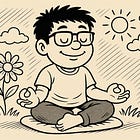The Discipline You Learned Before You Knew It
Tracing discipline back to where it begins
Discipline is everywhere. It shows up in small choices and in big moments, in the actions we take and the decisions that shape our lives. But discipline doesn’t appear on its own; it’s built. It takes shape through our interactions with the world around us, through the history and experiences we carry.
And what’s the very first experience we all share?
The relationship with our parents.
From the moment we’re born, discipline begins to be instilled. Not as some abstract force, but as a deeply human construct, passed from one person to another, embedded in cultural DNA, and absorbed in the way we see the world.
That first relationship becomes the foundation of how we develop discipline. Unconscious at first, but powerful in how it shapes the relationship we build with ourselves.
This is why I’ve been eager to share today’s piece. My friend, Charles Callis, has written a moving reflection on discipline and parenting, drawing from his own life to show how our earliest relationships influence the way discipline forms inside us.
Charles is a psychological and holistic therapist with a deep interest in wisdom and spirituality. In his personal Substack, he shares free weekly extracts from his book Your Emotional Life, a manual intended for young people but valuable at any age.
The story he shares today is also an invitation to reflect on how our own upbringing shaped our relationship with discipline, and how we, as parents, can nurture healthier foundations for the next generation.
I’ll let Charles take it from here.
You can discipline a child or you can teach that child discipline. These are two very different things.
If you impose your will on a child, you are training that child to be controlled. If you use reward and punishment for that training, you are doing what in psychology is called conditioning. In effect, you are removing the element of volition from the behaviour, so it is not true self-control. The self does not control the control, so what is learned is very restrictive and not capable of flexibility and adaptation. The child will behave in the prescribed way automatically. He or she will continue to do so beyond the point of its usefulness. It will become a serious handicap in adult life.
The only choice the adolescent will have is to go with the trained self and conform; or rebel and go the opposite way. The latter itself is not freedom of choice, it is a reactive choice. If the 'training' has been overly harsh or chaotic, the adolescent may well go off the rails because he has only been given rails; and abandon control completely. This is a recipe for disaster. It may end in criminal behaviour, substance abuse, abusive relationships and a life going nowhere. Too much discipline is a form of abuse that has long term consequences, whether these are visible or not.
I do not think of my upbringing as abusive. My parents loved me very much and did their best with what they had. But the strict parenting in my early childhood left a devastating mark. I withdrew into myself, conformed, did very well at school, which itself was very disciplinarian, and delayed my rebellion till I went to college. This compromised the start of my working life. At twenty I blamed my mother for my unhappiness and decided never to have any children as I didn't want them to go through what I had been through.
I then spent my twenties wandering around aimlessly and did not settle down to a career and marriage till my mid-thirties, teaching children with emotional and behavioural problems. It took a good deal of therapy in my forties to find myself again as I trained to become a psychological therapist for adults, but when I was fifty I was acting out my resentments in my relationship and nearly broke it. There has been a trail of emotional over-reaction when I think I've made a mess of something. I spent a long time punishing myself over things I got wrong in the past.
Since I had been taught not to express my emotions, it has taken me a long, long time to process all this. In fact, in my book about the emotional life, I begin the subject of what to do with difficult feelings with a chapter on the importance of expressing emotions and the many ways to do that and follow it up with a chapter with even more ways to process emotions without expressing them, because I have spent so much time learning how to do that. Now I am working on forgiveness. Not of my parents: I forgave them a long time ago. Forgiveness of myself.
When you consider the reasons why parents use excessive discipline, there are a number to consider. The most obvious is lazy parenting: ‘Do as I say, not as I do,' i.e. 'I'm not disciplined but you will be.' Busyness and stress combine to make parents react or seek to shortcut the process.
Then there is the repetition of forms of 'discipline' passed on from generation to generation. The parent parents as he or she was parented. This is the meaning of 'the sins of the fathers are visited on the children to the third and fourth generation.' Even when parents set out to do things differently, such is the power of conditioning that they often find themselves unconsciously falling into the same patterns.
Other external factors can contribute to the same problem. One father, stressed and working long hours, had already decided on a policy of strict discipline out of jealousy of his younger sister whom he perceived as having been indulged and spoiled. This he justified by reference to behaviourism. Then he remarried a controlling narcissist who was determined his older daughter should receive the minimum of attention and be kept in her 'place.'
The use and abuse of behavioural psychology has much to answer for in parenting practice. So-called 'controlled crying,' for example, I call by what it is, uncontrolled crying. Boundaries are important but should be negotiated where possible and maintained by insistence and persistence rather than reward, or punishment dressed up as 'consequences.' Reward has its place and social reward (praise) is the most important form. The learning of self-control is an educational practice and should be viewed as such. It requires appropriate communication, provision of knowledge, practice of skills, persistence and patience. Modelling is crucial: displaying and practising empathy and kindness from birth.
It is important when addressing 'bad' behaviour to consider and find out what is driving it. Maybe the child's needs are not being met. Maybe there is trauma that you do not know about. Maybe it's a call for help. Addressing the underlying problem is more important than addressing the behaviour itself. Listening is the critical skill. The pace of modern life militates against this, which makes it all the more important to make the time.
Two useful science-based books are:
The Silent Guides (Understanding and developing the mind throughout life), Prof. Steve Peters (2018)
Raising An Emotionally Intelligent Child, John Gottman and Joan DeClaire, 1998
I read this piece several times. Not only because I wanted to prepare it for this edition, but because it struck me as a parent of young kids. They are at that stage where they take in everything, and Charles’s words reminded me of the principles I want to keep close while raising them. Life moves fast, and it is easy to drift from what matters, but this text called me back.
Even if you are not a parent, I hope you stayed with the piece. All of us were raised by someone — a parent, a grandparent, or another loved one who stepped into that role. The way discipline was passed to us came through their lens, their experiences, and their attempts to guide us. That inheritance still shapes how we see the world today.
As parents, it is easy to fall into shortcuts. The quick solution feels tempting. A punishment, a reward, anything that settles the moment. But those choices carry forward. The discipline we model today becomes part of our children’s tomorrow. And of course, we do not always see it. Kids don’t either. That is part of being human.
Now, pieces like this are a call to attention. They remind us to return to our principles and to choose the long term even when the short term looks easier.
So as a takeaway, I would ask you to keep this piece in mind. We all want the best for our kids. And when we think about how we are shaping their world, we have to hold both the short term and the long term in view. The decisions we make should not only serve what is easiest for us, but what is best for them.
Discipline lives in the little things. In the everyday choices. From how you greet your child when you come back from work to the rituals you share at bedtime.
I hope you enjoyed this reflection. Remember: we are human. We will drift. And if you recognize some drift here, that is your call to come back.
I’m here for you if you need it
Have a wonderful week!
Ready to Put This Into Practice?
If today’s insight helped you shift your mindset, the paid companion will help you live it.
Every Thursday inside the Disciplined Circle, you’ll get:
✅ 5 targeted prompts to turn reflection into behavior
✅ A gentle challenge to realign without overwhelm
✅ A weekly tracker to measure what matters
✅ Plus exclusive tools to build sustainable discipline
This is where insight becomes action — one step at a time.
Start your realignment practice today — $7.99/month or $79.99/year.
Cancel anytime.
✨ Ideas Worth Exploring
If this piece resonated, here are a few more that go hand-in-hand.
Enjoying this? Support the mission.
I write Self-Disciplined to help more people build real, lasting discipline — without burnout. If my work has helped you, consider supporting it with a coffee or becoming a member.










Charles couldn't have said it better!
Thank you as always for your comments 🙏🙏
Discipline is a virtue we want to develop, but it shouldn't be our ultimate goal.
Discipline is the most essential quality to be imbibed since we start growing as a small kid from our early years.
We have to worship discipline to train our wards and make them understand the value of being disciplined 🦾.